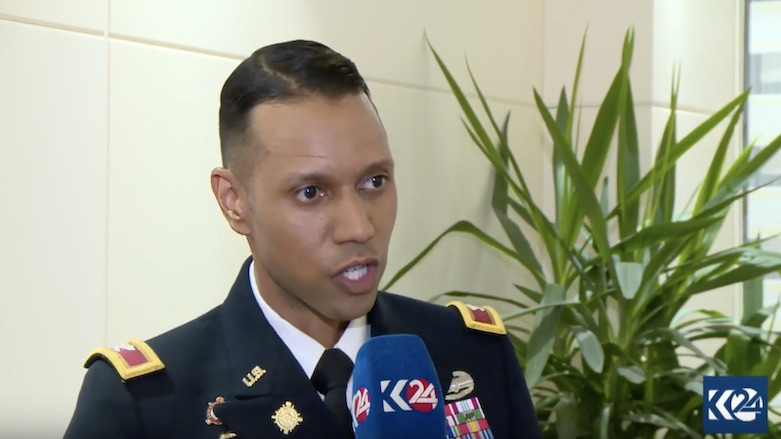Coalition remains militarily committed to SDF, Peshmerga forces: Spokesperson

ERBIL (Kurdistan 24) – The Coalition remains committed to its partnership with the Kurdistan Region’s Peshmerga and the Syrian Democratic Forces (SDF), Col. Myles Caggins, Spokesperson for the US-led Coalition, formally known as Combined Joint Task Force-Operation Inherent Resolve (CJTF-OIR), told Kurdistan 24 in an exclusive interview last week.
According to Col. Caggins, the United States’ partnership with the Peshmerga existed long before the fight against the so-called Islamic State began in 2014.
“The Peshmerga, together with the US forces within the Coalition, have been fighting terrorist groups in the past as well,” Caggins said.
A Kurdistan 24 team was recently granted exclusive access by the US-led Coalition to witness the ongoing US support for the SDF in eastern Syria.
“Kurdistan 24 had the opportunity to accompany the Coalition in a visit to two SDF bases in Deir al-Zor and Hasakah,” the spokesperson reminded, and saw “the relations [between the Coalition and the SDF], and the training that the US Special Forces are delivering to the SDF’s Kurdish and Arab forces.”
Read More: Kurdistan 24 Exclusive: US troops continue to fight ISIS but Turkish attacks ongoing
After US President Donald Trump ordered US troops to withdraw from northern Syria in early October and Turkey launched an attack on SDF forces along its southern border, it seemed the relations between the US and the SDF would be severely damaged, and the SDF would lean toward Damascus and Moscow.
Indeed, Russia brokered an agreement in late October with the Kurdish-led SDF to have the Syrian government take over positions on the border with Turkey.
However, in late October, Trump reversed his decision and announced that the US would leave forces in eastern Syria, and continue to work with the SDF.
“Our commitment to the fight against ISIS has never been impacted, and our partnership with the SDF continues to be in place,” Caggins explained to Kurdistan 24.
“Our activities [in northeast Syria] were slower for a little while, but Coalition members have resumed operations with the SDF, which is decisive in their mission.
Moreover, in a sign of continued support for the Peshmerga and SDF forces, the Coalition and its spokesperson began to use the Kurdish language for the first time in statements on social media and elsewhere.
Ji destpêka şerê li hemberî DAIŞ’ê ve heta niha jinan, di nava qadên şer de cihên xwe girtin û bi beşdarbûyîna xwe, cîhêrengîya di nav koalîsyona me de bihêztir dikin. Jin, aştî, ewlehî! #TwitterKurds #SDF
— OIR Spokesman Col. Myles B. Caggins III (@OIRSpox) November 2, 2019
The Coalition spokesperson acknowledged he only knows how to say “how are you” in Kurdish. “I have friends who help me reach audiences with different languages, and they are in Iraq, Kurdistan, and Rojava,” he said.
Col. Caggins also agreed with senior Kurdistan Region leaders that the death of Islamic State head Abu Bakr al-Baghdadi does not mean the end of the terror group.
“The killing of one fighter or leader of ISIS is not the end of this extremist group; we continue to put military pressure. At the same time, we endure denying the ideology of the group.”
He underlined that there are still a few thousand Islamic State fighters left in different areas of Iraq and Syria, including armed fighters and those who “support ISIS in area of funds and logistics.”
“We also want to capture or eliminate the remnants of ISIS in the region,” he added. “I think it is important to look at ISIS as an international threat.”
“We need to endure facing ISIS’ ideology in the region, where local partners are committed to continue the fight.”
Therefore, the US-led Coalition, with support from local partners, continues to target “ISIS sleeper cells both in Iraq and Syria, especially in Deir al-Zor.”
The Coalition also has trainers and advisors who are working with the Iraqi Security Forces and Peshmerga to maintain pressure against the Islamic State.
Caggins noted that there had been “progress” in the training and advising field, adding the Coalition would “take more steps.”
“I would like to give you an example which has been a successful experience: the Peshmerga were able to identify ISIS positions in low areas, and through their contact with the Coalition, they have been able to operate, either along with the Iraqi air force or the Coalition. This has helped to expose and target ISIS hideouts.”
The spokesperson underlined that the Coalition knows that the Islamic State remains active, and “are only looking for an opportunity” to regroup.
“Once there is chaos, they try to take advantage of the situation—yet, we have to fill the vacuums, to deny them the chance to control any part of the area.”
Editing by Karzan Sulaivany
